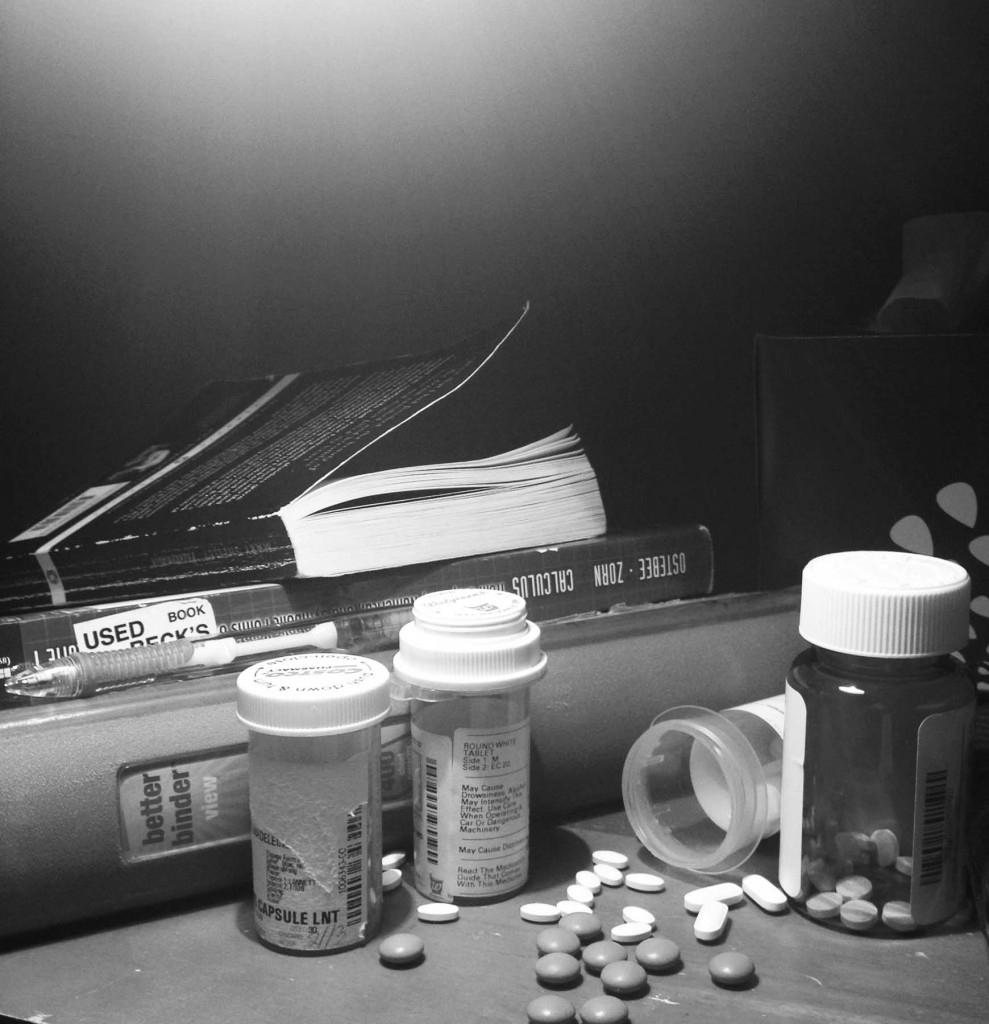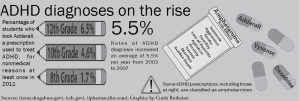
It all started with sports and steroids.
When Alan Schwarz, national correspondent for the New York Times, considered how high school football players were “compelled” to use steroids for competitive reasons, he predicted the same sort of thing would be happening in the biology classroom.
“Kids are kids,” said Schwarz. “The pressures are not dissimilar. What they will do to satisfy their parents or satisfy their community or their own self will be similar.”
Through his findings, Schwarz wrote an article published in the New York Times on June 10, 2012, about high school students using ADHD medications, regardless of whether they have been diagnosed with ADHD, to perform better in school.
Senior Brandon Narens became aware of students at Glenbrook North’s quest for “study drugs” his junior year around the ACT test dates. He said another student came up to him and asked if he knew of any “hook-ups” for the drugs. Narens said he said no to the student’s request.
“I feel like a lot of kids feel like they have to have some sort of aid to stay above or keep above the standards,” said Narens. “The kids take the drugs because they feel like if they don’t get a high ACT score they’re going to get nowhere with their life.”
Tanya Froehlich, assistant professor of developmental and behavioral pediatrics at University of Cincinnati, said that ADHD, or attention deficit hyperactivity disorder, is when kids have problems paying attention and keeping organized, as well as difficulties with over-activity and impulsivity.
According to Froehlich, ADHD is thought to be due to a deficiency of dopamine and norepinephrine in certain parts of the brain, which causes the neurons to have difficulty communicating with each other. ADHD symptoms should be pervasive, apparent early in a child’s development, and persistent, Froehlich said.
“ADHD is diagnosed based upon clinical features,” said Froehlich. “A child must exhibit a certain number of the ADHD symptoms both at home and at school, these symptoms must cause impairment, and they can’t be better explained by another disorder. There’s no lab test, neuroimaging test, or neuropsychological computer test that can reliably diagnose ADHD.”
When Schwarz was writing his article, he said he was the most surprised at “the ease with which kids brag about fooling their doctors” into giving them prescriptions intended to treat ADHD.
According to the Center for Disease Control and Protection, rates of kids six to 17 years old diagnosed with ADHD increased at an average of 5.5 percent from 2003 to 2007.
School psychologist Russell Katahira agrees that the number of kids prescribed ADHD medications has increased at GBN as well as across the board nationally.
“These are stressful times that we all live in, and parents are more actively seeking assistance from outside providers to help parenting and behavior management,” Katahira said.
Schwarz hoped that readers of his article would become aware of how high school students are increasingly abusing ADHD medications and prescriptions to improve their performance in school.
“I would not characterize it as a national epidemic, there are bigger health issues, but…this is happening more and more and it seems to be under parents’ radar,” Schwarz said.
While Katahira has read about ADHD prescription abuse at the college level, he said he has not heard about it as much at the high school level.
“High school kids who struggle with attention can get their academic needs [met] through the various high school courses,” said Katahira. “In college, those don’t really exist. I think GBN has a good support system for kids, so I don’t frequently hear kids going out and getting other kids prescriptions to help them improve their class performance.”
Junior Daniel Hensel said if kids take the ADHD medications to perform better on tests when they do not have ADHD, they ruin the “fairness” of the exams.
“The reason why we take exams and tests is to objectively determine the substance that an individual knows,” said Hensel. “If a person is physically altering themselves…it’s not a meaningful determination of who they are in regards to that test.”
Narens also believes some kids convince themselves they have ADHD without hearing a doctor’s opinion.
“It’s like [kids who convince themselves think it’s] a joke, or a fun thing to have,” said Narens. “[They’re] like ‘Oh haha I can’t pay attention when you talk, I must have ADHD.’”
While Katahira believes there is a pressure to perform at a “high level” at GBN, he said kids should not turn to medications to solve their problems.
“I think it’s pretty well known that Americans are always looking for a quick solution to challenges, and there’s a heavy reliance on medications to hopefully find a quick response,” said Katahira. “I think as a nation, we’re way too dependent on medications to work through our problems.”


